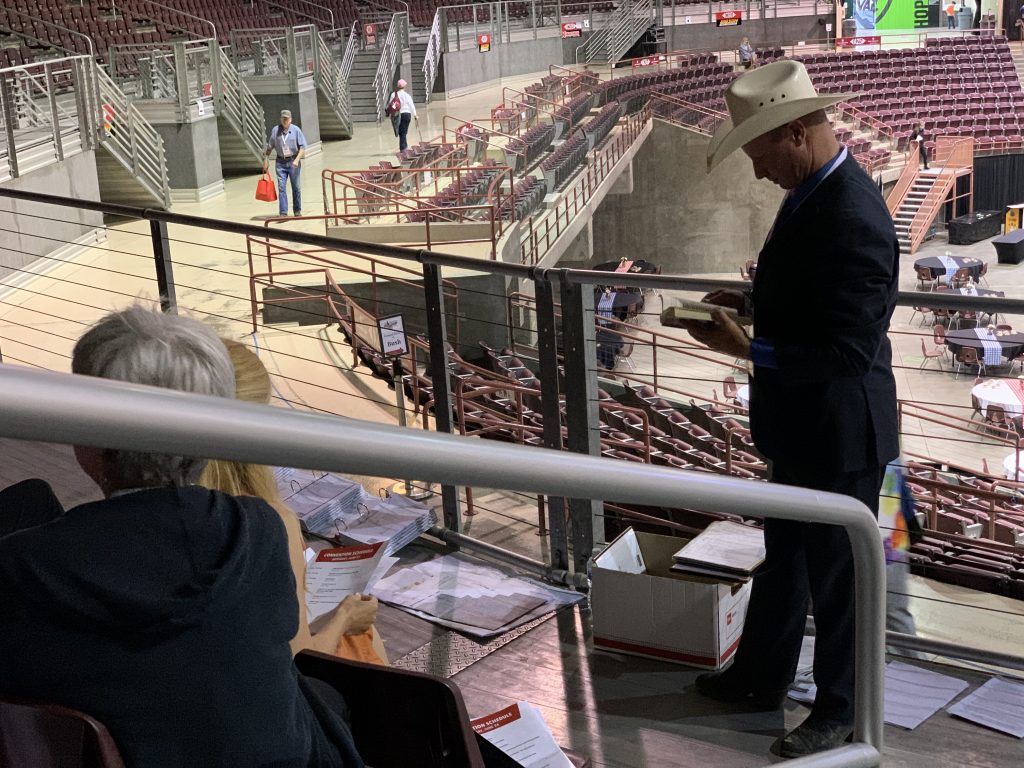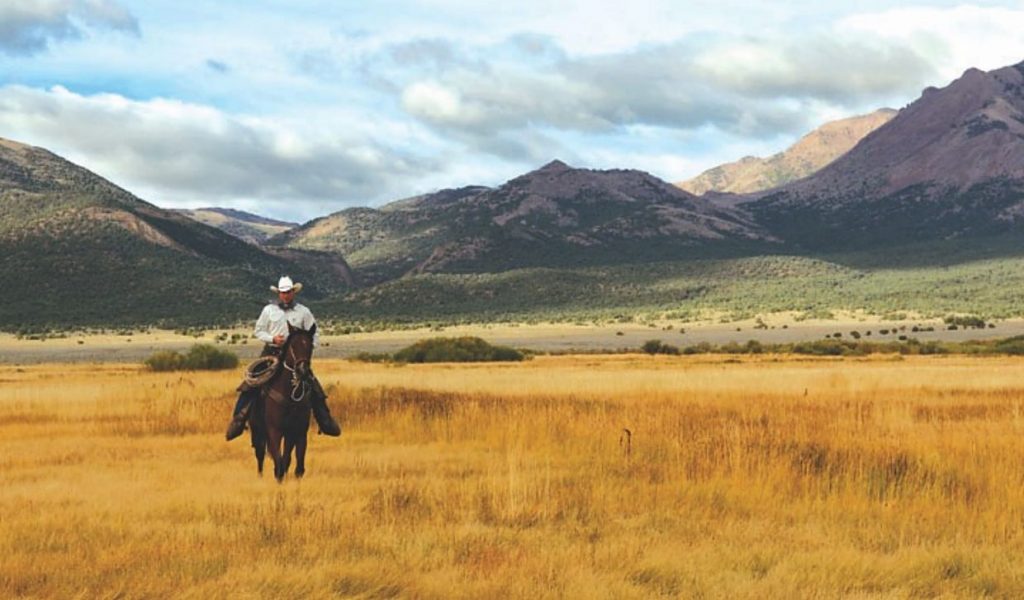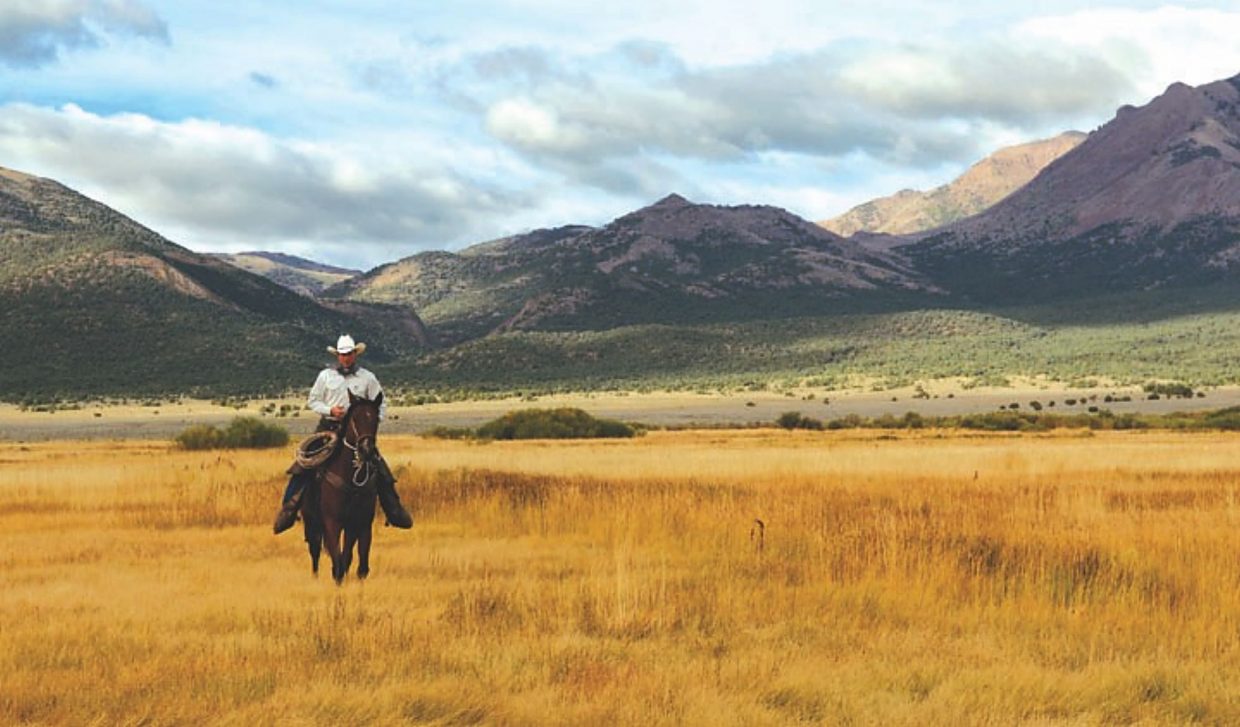In a section of bleachers marked as the “Eisenhower Room” at the 2020 Idaho Republican Convention, an unassuming man in a cowboy hat waits quietly for us to take our seats. His suit is neat and well fitted, but his worn boots suggest he is more at home on the ranch than in front of a convention crowd.
“I was raised in the sage brush,” he said, leaning against the railing.

We waited patiently while he worked with staff to get the microphones working properly. That finally accomplished, he began to tell his story.
When Wayne Hage Jr. was a small child, his parents Wayne Sr. and Jean Hage purchased Pine Creek Ranch, which consisted of 700,000 acres in central Nevada. Property rights on Pine Creek Ranch had been established through various contracts, some of which predated Nevada’s admission to the Union in 1864. The Federal Government recognized those rights in an 1866 act that allowed ranchers the ability to traverse federal lands with their herds to reach water sources that they owned. Yet throughout the 1960s and 70s, the United States Forest Service and the Bureau of Land Management had been taking issue with this practice. It was partly due to the conflict with the federal government that drove the owners of Pine Creek Ranch to sell, but Hage figured he might have better luck.
“If we had kept that place, we were going to kill someone,” the previous owner’s son later said.
85% of land in the state of Nevada is owned by the federal government, and it often seems like they are jealous of the 15% that is still privately owned. Shortly after the Hage family purchased Pine Creek Ranch, they began receiving harassment from federal officials. First, the USFS fenced off the water source that was attached to Pine Creek and told the Hages that they needed a grazing permit to cross federal land – a permit they later rescinded. Then, the government changed fencing regulations, forcing the Hages to spend thousands of dollars and much time and energy replacing their existing fencing. Finally, they fined the Hages for cleaning brush out of irrigation ditches that crossed federal lands.
In 1991, Wayne Hage had enough. He sued the federal government, claiming that these actions amounted to an illegal taking of their property and water rights. Thus began a 25-year-long battle between private ranchers and the full might of the United States government. Wayne Hage Jr. was only fifteen when the court battle began, having spent his entire life thus far tending cattle on Pine Creek Ranch. After high school, the junior Hage attended Hillsdale College in Michigan where he majored in Constitutional law, an education that would serve him well in the long war to protect his family’s property rights.

“It’s the nature of governments throughout the ages – not just ours – to encroach on our liberty,” said Hage Jr. His wife grew up in Kazakhstan during the time of the former USSR, so Hage Jr. and his family are familiar with the excesses of totalitarian governments.
In 1998, the Court of Claims ruled that no taking had taken place, since the Hage family had not tried walking their cattle through the off-limits federal land to reach their water. They were forced to break the law to force the issue. The government cited them for trespassing, fined them, and even seized some of their cattle. However, the Hages now had an actionable claim to take to the Court.
About ten years later, the Chief Judge of the District Court for Nevada ruled in favor of the Hage family, saying that not only was the federal government wrong to block access to their water rights, but also that they had engaged in a campaign of intimidation against the Hage family and all of their business partners.
Wayne Hage Jr. recalled Jim Nelson, head of the National Forest Service’s holdings in Nevada, saying, “I’m gonna take out the toughest son of a bitch and the rest of the ranchers will fall in line.”
The Hage family was heartened by the decision of the Nevada District Judge, but their joy would not last. The federal government appealed the decision to the notorious 9th Circuit Court of Appeals. According to Hage Jr., government lawyers started making things up out of whole cloth, lying to the court about circumstances of the case.

“The Department of Justice is going to lie,” Hage Jr. said.
They painted the district judge as being “biased,” even though he had always been deferential to the BLM and USFS before this ruling. The 9th Circuit reversed the case and ruled against the Hage family. When the Supreme Court declined to grant certiorari, the last hope of the Hages was gone.
The government fined the Hage family several million dollars and foreclosed on their ranch, a process that was completed in 2019. By now, Wayne Hage had died, and both his first wife Jean and his second wife Helen Chenoweth-Hage were gone as well. Wayne Jr. was no longer a 15-year-old ranch hand, but now the family patriarch, with a wife and children of his own. There was a silver lining to the story, however. Some friends of the Hages purchased their ranch at auction and are now renting it back to the family, allowing them to stay on the land that has been in their family for more than forty years.

The message that Wayne Hage Jr. had for the Convention was that the fight for property rights is always worth fighting. Throughout the long battle with the government, his family had some wins and some losses, but throughout it all their spirits remained high and their faith in God remained strong.
“No matter how bad things get, there’s always someone out there having a worse time,” said Hage Jr.
The fight between private landowners and the federal government is just beginning. One Idaho rancher who attended the discussion explained that government agencies had come calling on ranches throughout the state offering to take over water rights, to “protect” them. While the government promised to allow ranchers to continue to use these water sources, most of them recognized the obvious poison pill and refused the offer. Yet the government has not let up on their endless hunger for more and more land. Men live but a short time, while the US government seems to last forever.
“There is no justice in America,” said Hage Jr. in a moment of sadness. He quickly perked back up, however. The most important advice the rancher had for everyone in the room was to carefully research and keep track of title claims. “Once you know what you own, you know what to defend,” he said.
Property rights are based on contracts, tax rolls, bills of sale, and other documents, some of which go back more than a century. If you can back up your claims with documentation, you can often win in court. It takes long hours spent at the county courthouse and the library to piece together the history of a piece of property, but it is time well spent. Besides, as Hage Jr. said, “It’s a fun puzzle to put together.”
“Title transcends government,” he explained. Hage Jr. told a story about visiting a rancher in his wife’s homeland of Kazakhstan whose family owned several million acres. The land had been seized by the USSR in the 1930s, but the family took their title documentation and buried it in a secret location, along with their silver and gold. By the year 2000, Kazakhstan was once again independent, and they were sorting out who owned what land. The title documentation that this family had hidden away so long ago allowed them to reclaim what had been stolen from them so long ago.
Even though Wayne Hage Jr. and his family ultimately lost their fight, it was a pyrrhic victory for the federal government. The courts ruled that the Hages had no right to cross federal land without a permit, but they instead must pipe their water through public lands. This ruling ended up giving ranchers tremendous bargaining power with the government. If they are not granted grazing permits, they can now build a pipeline rather than allowing their water source to be used by wild horses or elk herds recently introduced by the US Forest Service. To keep ranchers happy, USFS and BLM now have incentive to grant the permits rather than losing access to these private water sources. Wayne Hage Jr. sees this as a victory in the end.
“We’re better off now than when we owned the place.”
Further reading: “Storm Over Rangelands: Private Rights in Federal Lands” by Wayne Hage Sr.










The Hage story is fascinating, glad to hear Wayne is speaking, advocating and keeping up the fight. In this article I found the our great former Congresswomen married his dad, I know Helen married a Nevada rancher but I didn’t know he was assisted with this long term and important battle.
Would love to have an update as to how Jr is doing..?